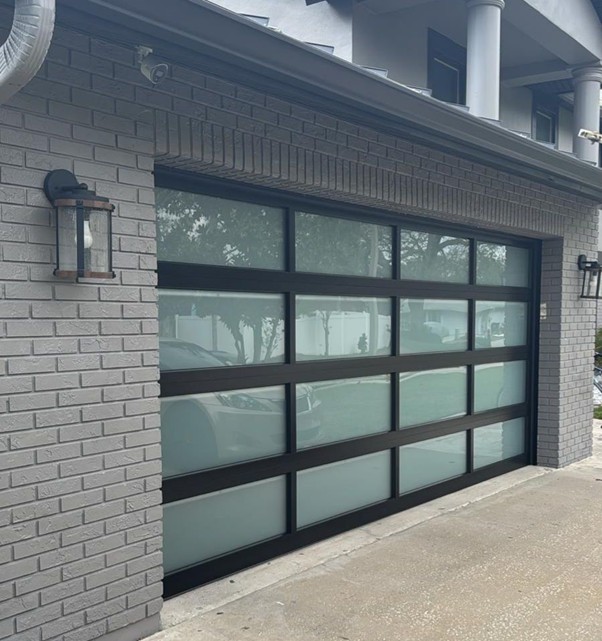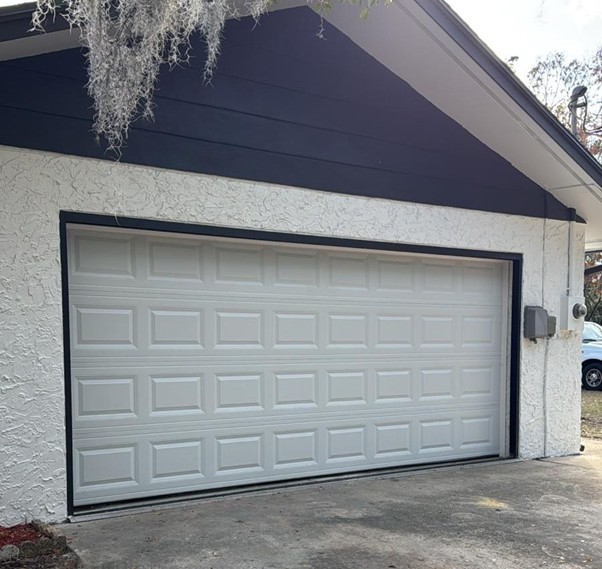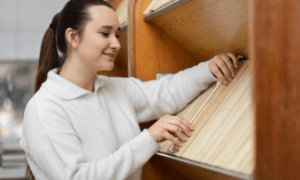Few things are as frustrating as a garage door that won’t open when you’re rushing to work or won’t close when you’re trying to secure your home for the night. Your garage door is a complex system of moving parts, and like any mechanical system, it’s prone to occasional issues. While some common problems can be tackled with a little DIY know-how, others require the expertise and specialized tools of a professional. This guide will walk you through the most frequent garage door malfunctions, offer potential DIY solutions, and, crucially, tell you when it’s absolutely time to call in the experts.
The Anatomy of a Frustration: Why Garage Doors Malfunction
Understanding the basic components of your garage door system can help you diagnose problems. The system typically includes the door panels, tracks, rollers, springs (torsion or extension), cables, the opener unit (motor, chain/belt/screw drive), and safety sensors. A malfunction in any one of these parts can bring the whole operation to a grinding halt. When in doubt, remember that a professional from GARAGE DOOR ON can quickly and accurately diagnose even the most complex issues, ensuring your door operates safely and reliably.
Common Garage Door Problems and Potential Solutions
Let’s dive into the most frequent issues homeowners encounter:
1. The Garage Door Won’t Open or Close Completely
This is perhaps the most common and annoying problem.
- Potential DIY Fixes:
- Check the Power Source: Ensure the opener is plugged in and the circuit breaker hasn’t tripped. A power outage is a simple, non-mechanical reason for the door not working.
- Remote Control Batteries: Dead batteries in your remote are a surprisingly common culprit. Replace them and try again.
- Photoelectric Safety Sensors: These are the small units located a few inches off the ground on either side of the door tracks. If they are misaligned, dirty, or obstructed, the door’s safety mechanism will prevent it from closing (and sometimes opening). Check for cobwebs, debris, or if one sensor has been bumped out of alignment. Gently wipe the lenses clean and ensure they are pointed directly at each other (many have an indicator light that will turn solid when aligned).
- Manual Release Lever: If the door is stuck open or closed, check if the red emergency release cord has been pulled. This disconnects the door from the opener, allowing for manual operation. Re-engage it if it was pulled accidentally (refer to your opener’s manual for proper re-engagement).
- Limit Settings: The opener has settings that tell it how far to open and close. These can sometimes get out of adjustment. Consult your owner’s manual for how to reset these limits.
- When to Call a Pro: If none of the above solutions work, or if the door reverses immediately after touching the ground, there might be an issue with the opener’s motor, circuit board, or spring tension, all of which require professional attention.
2. The Garage Door Is Unusually Noisy
A symphony of squeaks, grinds, or rattles can be alarming.
- Potential DIY Fixes:
- Lubrication: The most common cause of noise is a lack of lubrication. Use a silicone-based lubricant (avoid WD-40, which can attract dirt) on hinges, rollers (not the wheels themselves, but where the wheel meets the shaft), and springs.
- Tighten Loose Hardware: Over time, bolts and screws can loosen from the door’s movement. Carefully inspect and tighten any loose nuts or bolts on the tracks, hinges, and opener mounting brackets.
- Check Rollers: Worn or damaged rollers can cause significant noise. Inspect them for flat spots, cracks, or excessive wobble. While replacing rollers can be a DIY task, ensure you have the right tools and follow safety precautions.
- When to Call a Pro: If the noise persists after lubrication and tightening, or if you hear a loud “snap” which could indicate a broken spring, do not attempt to fix it yourself. This is a job for a professional.

3. The Garage Door Opens Partially and Then Stops
This often points to issues with the door’s balance or the opener’s strength.
- Potential DIY Fixes:
- Test Door Balance (with caution!): With the door closed, pull the emergency release cord to disconnect the opener. Try to lift the door manually. A properly balanced door should stay put when lifted halfway up. If it falls or shoots up, the springs are likely out of adjustment.
- Check for Obstructions: Look for anything blocking the tracks or hindering the door’s movement, like bent track sections or debris.
- When to Call a Pro: An unbalanced door is a clear sign of spring issues, which are extremely dangerous to attempt to repair yourself. Torsion springs are under immense tension and can cause serious injury or even death if mishandled. Call a professional immediately.
4. The Garage Door Shakes or Jerks When Moving
Jerky movement can be caused by various factors, often related to the door’s alignment or components.
- Potential DIY Fixes:
- Lubrication: Again, lack of lubrication on moving parts can cause friction and jerky movement.
- Check Tracks: Inspect the tracks for any bends, dents, or debris. Use a rubber mallet to gently tap out minor dents, but be careful not to damage the track. Ensure the tracks are clean.
- Roller Condition: Worn rollers can also cause jerky motion.
- When to Call a Pro: If the tracks are significantly bent, the rollers are severely damaged, or if the door continues to jerk after lubrication and track inspection, a professional will be needed to ensure proper alignment and identify deeper mechanical issues.
5. The Remote Control Isn’t Working (But Wall Button Is)
This narrows the problem down to the remote or the opener’s receiver.
- Potential DIY Fixes:
- Change Remote Batteries: Start here, always.
- Reprogram Remote: Your opener’s manual will have instructions on how to reprogram your remote control. Sometimes, the connection can be lost.
- Check for Signal Interference: While rare, strong radio frequencies or other electronic devices can sometimes interfere with the remote’s signal.
- When to Call a Pro: If new batteries and reprogramming don’t work, the remote itself might be faulty, or there could be an issue with the opener’s receiver. A professional can diagnose and replace faulty components.
6. The Garage Door Goes Up But Won’t Come Down (or Vice Versa)
This often indicates an issue with the safety sensors or limit settings.
- Potential DIY Fixes:
- Safety Sensor Alignment/Obstruction: As mentioned before, check and clean the photoelectric sensors. This is the most common reason for the door not closing.
- Limit Settings: The “down limit” setting might be off, preventing the door from closing completely. Adjust it according to your opener’s manual.
- When to Call a Pro: If the sensors are clear and aligned, and limit adjustments don’t solve the problem, there might be a fault in the opener’s logic board or internal wiring, requiring professional repair.
When to Absolutely Call a Professional
While DIY fixes can save you money and time, some garage door problems are not only complex but downright dangerous to attempt without proper training and tools.
- Broken Springs: Garage door springs (torsion or extension) are under immense tension and are incredibly dangerous to repair or replace without specialized tools and knowledge. A broken spring can cause severe injury or even death. NEVER attempt to fix broken springs yourself.
- Bent Tracks: While minor bends can sometimes be straightened, severely bent or damaged tracks can cause the door to fall, leading to serious injury or property damage. Professional re-alignment or replacement is necessary.
- Damaged Cables: Cables work in conjunction with springs to lift and lower the door. Frayed or broken cables indicate a highly stressed system and can cause the door to crash down unexpectedly. Like springs, these are under tension and should only be handled by a professional.
- Opener Motor Problems: If the opener motor is humming but the door isn’t moving, or if you smell burning, the motor could be failing. This requires a professional diagnosis and potentially a replacement.
- Major Door Impact Damage: If your car hits the door, causing significant bending or structural damage, the entire door’s integrity is compromised. A professional can assess the damage and determine if repairs are feasible or if a replacement is safer.
Regular Maintenance: Your Best Defense Against Breakdowns
Many common garage door problems can be prevented with simple, regular maintenance.
- Lubricate Moving Parts: Do this every 3-6 months.
- Inspect Rollers: Check for wear and tear annually.
- Check Track Alignment: Ensure they are clean and free of debris.
- Test Safety Sensors: Perform the “block test” (placing an object in the door’s path) monthly.
- Balance Test: Annually, perform the balance test (with caution).
Conclusion: Don’t Get Stuck, Get Smart
Your garage door is a vital part of your home. Understanding common problems and knowing when to call a professional can save you frustration, time, and money. While some minor adjustments can be handled yourself, prioritizing safety and recognizing the limits of DIY repairs is crucial. For any complex or dangerous issues, don’t hesitate to reach out to experienced professionals who can ensure your garage door operates safely and efficiently for years to come.
Contact Us Today!
For expert advice, professional installation, and reliable garage door repair services, contact us:
Address: 3104 N Armenia Ave #2 Tampa FL 33607
Phone: 813-461-6009
Email: Garagedooronfl@gmail.com




































